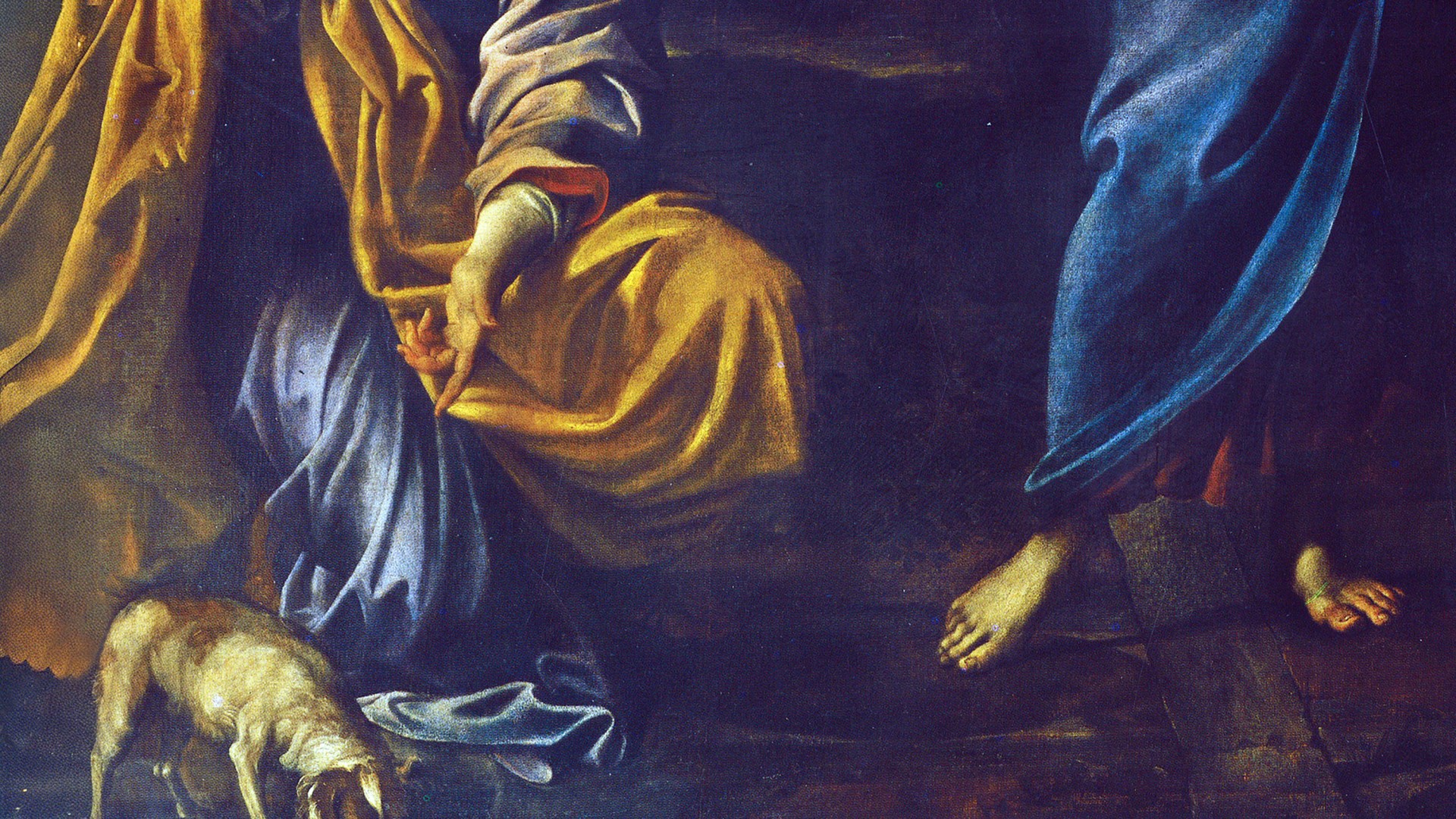When Japanese animation auteur Hayao Miyazaki’s The Boy and the Heron was first released last December, I was in the thick of grief and never made it to the cinema. Another opportunity to watch the movie arose when Netflix released it globally this October (Max is distributing it in the US).
Just as loss has played a role in my life as of late, so it takes center stage in this Oscar-winning film for Best Animated Feature. Set in World War II–era Japan, the opening scene depicts the hospital where young protagonist Mahito Maki’s mother works. The hospital is on fire. “Three years into the war, my mother died,” Mahito (voiced by Soma Santoki in Japanese and Luca Padovan in English) says as the scene ends.
One year after this tragedy, Mahito and his father leave Tokyo and move to the countryside, which remains unspoiled by the ravages of war. There Mahito encounters a talking gray heron who tells him that his mother is not, in fact, dead. Although Mahito doesn’t believe what the bird says, he decides to venture into a mysterious world to see for himself—and to locate his pregnant stepmother, Natsuko, whom Mahito suspects has been kidnapped into the alternate universe.
As are many of Miyazaki’s films, The Boy and the Heron is at times confusing. Storylines feel disconnected from one another, characters’ motivations are hard to discern, and the film concludes rather abruptly, with Mahito and his family heading back to Tokyo.
But this inscrutability might be just the point the animator wants to make. Mahito’s world has turned upside down and inside out. Nothing makes sense: not his father’s new relationship with his mother’s sister, the baby growing in her belly, or Mahito’s fight with a school bully.
Loss is always incomprehensible, and our experiences of grief can feel as alien as the magical reality that Mahito encounters. Days go on, but they now feel strange, uncomfortable, wearisome—and baffling. As I read Scripture during a Sunday service a few months ago, I suddenly felt as if I had been transported out of myself. My mouth was forming and speaking all the right words, but they suddenly and completely lost all meaning.
In the psalms of lament, David articulates his questions to God out of painful confusion, slings them from Goliath-sized despair. “My soul is in deep anguish,” he groans. “How long, Lord, how long?” (Ps. 6:3). In another entry, the psalmist says, “Why, Lord, do you stand far off? Why do you hide yourself in times of trouble?” (10:1).
David bemoans God’s apparent remoteness as much as he yearns for a reminder of his nearness. And he’s audacious enough to question the Lord about what he has and has not done.
The Boy and the Heron allows us to wonder: What might we gain when we embrace loss as the psalmist did rather than trying to hide from it, overcome it, or reject it outright? Through twisting narratives and events that defy explanation, The Boy and the Heron insists that grief might open us up to weird and wonderful things. It might even become an unexpected companion along our way.
As my counselor helpfully invited me to consider, can you invite your grief to journey with you?
While Mahito searches for his stepmom, he befriends a few unlikely characters. One of them is the gray heron (Masaki Suda/Robert Pattinson), eventually revealed to be a balding man with a bulbous nose.
Though the gray heron is positioned as Mahito’s guide, he often appears more the deceitful antagonist than a benevolent helper. Still, he rescues Mahito from a fleet of carnivorous parakeets and helps him to save another character, Lady Himi (Aimyon/Karen Fukuhara), who Mahito comes to realize is a younger version of his mom.
Mahito also meets Kiriko (Ko Shibasaki/Florence Pugh), an old maidservant in the real world who’s a young fisherwoman in this one. “This world is full of the dead,” says Kiriko as the two watch phantom ships rowed by ghostly boatmen. Yet Kiriko herself defies that somber judgment. In this world, she appears full of life; she’s fiercely protective of the warawara, little white blobs with tiny hands who jump, twirl, and float. As the warawara fly toward the sky, Kiriko tells Mahito that they are going to be born as people “in the world you came from.”
Striking up a friendship with Kiriko makes no sense; their relationship doesn’t seem to bring Mahito any nearer to rescuing Natsuko. But these encounters do allow Mahito to meet extraordinary creatures—and encourage him to experience awe.
I’m learning that even as it disorients us, loss amplifies our wonder. We marvel at what still endures, against all odds, in the chaos that consumes us. We experience a deepened awareness of God’s faithfulness, a recognition that we have not survived on our own.
This fall, I’m noticing the changing color of leaves, the squeals of children playing tag, and the comforting aroma of banana bread baking in the oven. I’m finding that my loss makes new connections possible—like a recent conversation at a bakery with a fellow shopper who had also lost a loved one. In that brief moment, we felt less like strangers and more like kin, speaking a bizarre language that no one else around heard.
The story of the two disciples on the road to Emmaus offers an example of loss’s greatest surprise (Luke 24:13–35). The travelers are in shock, grieving Jesus’ crucifixion and baffled by the empty tomb—that is, until Jesus walks with them, explains what Scripture testifies about himself, and, as they break bread together, opens their eyes to who exactly is across the table. His presence has accompanied them in their sorrow, matching their pace.
These disciples become witnesses to Christ’s resurrection and his power over death, returning to Jerusalem to declare to the other disciples, “It is true! The Lord has risen” (Luke 24:34).
There’s Good News. But first, there’s Good Friday.
In one poignant final scene, Mahito and Lady Himi stand before doors that will bring them back to their own worlds as the fantastical landscape crumbles into oblivion.
“But if you go back there, you’re going to die in the hospital,” says Mahito desperately. “Please don’t; you’ve got to live, Himi.”
“I have to go back there, as I’m going to become your mother,” Himi says.
I watched this scene angrily. Why didn’t things turn out differently for mother and son? Why did they have to return without any hope for change, without accomplishing a happy ending?
Herein lies Miyazaki’s keen penchant for telling the truth as it is: We don’t get to choose how life unfolds. Not knowing why we lose far too early the ones we love will always be a torture.
And that’s what Miyazaki misses: Death can’t kill our Christian hope.
Befriending loss is a commitment to keep on living, however arduous and meaningless the interminable days ahead might seem. It is a commitment to a sure and certain hope that we will meet our loved ones again in the new heaven and new earth, where “the dead in Christ will rise first,” and we who are still alive will be caught up with them, and “we will be with the Lord forever” (1 Thess. 4:16–17).
And when forever is hard to grasp, living into our loss gives us room to explore, imagine, and even embrace eternity. I dream of being reunited with my loved ones in a field full of flowers or along a sandy beach. Who knows? My contemplation might seem fanciful or futile—but for me, it’s a form of anticipation, even joy.
Like Mahito’s intrepid adventures in the dreamscape, grief takes us on a bewildering journey. We chart its confounding contours, venturing into dark caves and weathering rocky waves, all so we can find ourselves again—different, and maybe unrecognizable, but still shaped and formed through relationships with Jesus and with other believers in Christ.
For now, my experiences of devastating losses have stained my sight; life still seems dark, gray, and one-dimensional. Hope is as fleeting as the film’s enigmatic gray heron, rather than that thing with feathers that perches in my soul.
And yet, though my senses are dulled, they’re still alive. I hear, taste, and touch elements of God’s presence around me every day. As The Boy and the Heron’s Japanese-language title goes: How Do You Live? The film answers this by showing how we can live with grief as a friend rather than an unwelcome visitor, allowing it to open us up to the peculiar and valuable gifts it may offer along the way.
Isabel Ong is the Associate Asia editor for Christianity Today.




































































